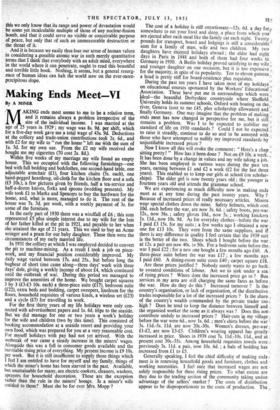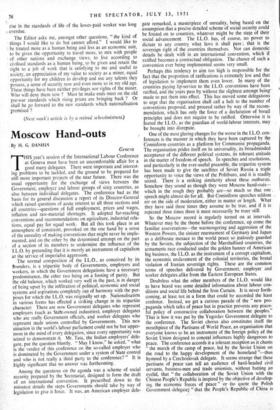Making Ends Meet VI
By A MINER
AKING ends meet seems to me to be a relative term, and it remains always a problem irrespective of the size of the individual income. I was married at the age of 25 years in 1929 ; my wage was 8s. 9d. per shift, which for a five-day week gave me a total wage of 43s. 9d. Deductions at the colliery and trade-union. contributions took 2s. 6d., and with £2 for my wife to " run the home " left me with the sum of ls. 3d. for my own use. From the £2 my wife received she bought me my cigarettes (70 cost 2s. 8d.).
Within five weeks of my marriage my wife found an empty house. This we occupied with the following furnishings-one bed with full bedding and bedclothes, one second-hand table, one adjustable armchair (£1), four kitchen chairs (5s. each), one hand-pegged hearthrug, oil-cloth for the kitchen floor and a sofa (£5 10s.), 'a few pictures given by friends, half a tea-service and half-a-dozen knives, forks and spoons (wedding presents). My wife took £1 to Marks and Spencers to buy the hardware for the home, and, what is more, managed to do it. The rent of the house was 7s. 3d. per week, with a weekly payment of 3s. for some of the furniture.
In the early part of 1930 there was a windfall of £6 ; this sum represented £5 plus simple interest due to my wife for the lois of her father killed at the pit in 1921, and payable to her when she attained the age of 21 years. This we used to buy an Acme wringer and a pram for our baby daughter. These then were the circumstances of my early married life.
In 1931 the colliery at which I was employed decided to convert the pit to machine-mining. As a result I took a job on piece- work, and my financial position considerably improved. My daily wage varied between 17s. and 25s., but before long the bugbear of short time came along-three days' work with three days' dole, giving a weekly income of about £4, which continued until the outbreak of war. During this period we managed to improve the amenities of the home. We bought carpet squares 3 by 3 (£3-£3 10s. each) a three-piece suite (£17), bedroom suite (£22), extra beds and bedding, carpet sweepers, linoleum for the floors, household requisites of various kinds, a wireless set (£23) and a cycle (£7) for travelling to work. For the first thirty, years of my life holidays were only con- nected with advertisement papers and Is. 6d. trips to the seaside. But we did manage for one or two years a week's holiday for the wife and children (two by this time). This consisted of booking accommodation at a seaside resort and providing your own food, which was prepared for you at a very reasonable cost. For myself holidays with pay had not yet artived. With the outbreak of war came a steady increase in the miners' wages. Alongside this was a fall in consumer goods available and the inevitable rising price of everything. My present income is £9 10s. per week. But it is still insufficient to supply those things which I feel I am entitled to have for myself and my family, things of which the miner's home has been starved in the past. Available, but unattainable for many, are electric cookers, cleaners, washers, sprayers for household decoration. These are the exception rather than the rule in • the miners' homes. Is a miner's wife entitled to them? Must she be for ever Mrs. Mopp ? The cost of a holiday is still extortionate-12s. 6d. a day fort somewhere to eat your food and sleep, a place from which you are ejected after each meal like the family cat each night. Twenty pounds for transport, board and lodgings is still a considerable 1 sum for a family of man, wife and two children. My two daughters have enjoyed holidays abroad ; the elder had eight days in Paris in 1948 and both of them had four weeks in Germany in 1950. A Butlin holiday proved satisfying to my wife;, and younger daughter on one occasion, but it is too expensive for the majority, in spite of its popularity. Ten to eleven guineas a head is pretty stiff for board-residence plus requisites. During the past ten years I have taken most of my holidays on educational courses sponsored by the Workers' Educational -; Association. These have put me in surroundings which were ideal-the beautiful Derbyshire countryside where Sheffield University holds its summer schools, Oxford with boating on the.' river, Geneva (cost to me £45, plus scholarship allowance) and' . finally Germany. One may imagine that the problem of making ends meet has now changed in perspective for me, but it still , remains a problem. Was I to be expected to stabilise my standard of life on 1930 standards ? Could I not be expected to raise it steadily, continue to do so and to be annoyed with those who have attempted to nullify my improved standards by unjustifiable increased prices ?
Now I know all this will evoke the comment: "Here's a chap sitting pretty! " How has it been done ? Not on £9 10s. a week.. It has been done by a change in values and my wife taking a job. She has been employed in various ways during the past ten years, earning between £1 and £2 a week (f2 for the last three years). This enabled us to keep our girls at school (on scholar- ships). The elder girl is now twenty years old ; the younger is fourteen years old and attends the grammar school.
We are experiencing as much difficulty now in making ends meet as at any time during the past twenty years. Why ? Because of increased prices of really necessary articles. Miners wear special clothes down the mine. Safety helmets, which cost loci. each before the war, are now 3s. 6d. ; safety boots, pre-war 12s., now 36s. ; safety gloves 10d., now 5s. ; working knickers Is. 11d., now 10s. 9d. As for everyday clothes-before the war I paid £3 15s. for my suits ; a few weeks ago I obtained a new one for £13 10s. They were from the same suppliers, and it there is any difference in quality I feel certain that the 1939 suit is the better of the two. Shoes which I bought before the war at 12s. a pair are now 40s. to 50s. For a bedroom suite before the war I paid £22 ; for a new one bought a few months ago £60. A three-piece suite before the war was £17 ; a few months ago I paid £60. A dining-room suite costs £40 ; carpet square £18.
Are these prices justified ? Nobody surely wants to go back to sweated conditions of labour. Are we to sink under a sea of rising prices ? Where does the increased price go to ? Bus services in my area are still charging the same fares as before the war. How do they do this ? Increased turnover ? Is the country's organisation, or lack of organisation, of the distributive trades responsible for a lot of the increased prices ? Is the share of the country's wealth commanded by the private trader too high ? Does he tend to keep the distance between himself and the organiSed worker the same as it always was ? Does this not contribute unduly to increased prices ? Hair-cuts in my village ; before the war were 6d., now ls. 6d. ; men's shirts before the war 3s. 11d.-5s. 1 ld. are now 20s.-30s. Women's dresses, pre-war , £1-£2, are now .£3-£5. Children's wearing apparel has greatly increased in price. Shoes in 1939 cost 7s. 11d.-10s. lid., and at present cost 30s.-35s. Among household requisites towels were previously 3s. 11d. a pair, now 10s. 6d. ; a bale of bedding has increased from £1 to £5.
Generally speaking, I feel the chief difficulty of making ends meet is in renewing household goods and furniture, clothes and working necessities. I feel sure that increased wages are not solely responsible for these rising prices. To what extent are they due to the trading section of the community taking undue advantage of the sellers' market ? The costs of distribution appear to be disproportionate to the costs of production. The rise in the standards of life of the lower-paid worker was long ? overdue.
The Editor asks me, amongst other questions, " the kind of things I would like to do but cannot afford." I would like to be treated more as a human being and less as an economic unit, to be given the opportunity to travel more, to mix with people of other nations and exchange views, to live according to .civilised standards as a human being, to be given and retain the -right to a job of work that is satisfying to me and useful to society, an appreciation of my value to society as a miner, equal opportunity for my children to develop and use any talents they possess, a sense of security now and even more so in my old age. These things have been neither privileges nor rights of the miner. Who will deny them now ? Must he make ends meet on the old pre-war standards which rising prices are bringing back ? Or shall he go forward to the new standards which nationalisation promised ?
(Next week's article is by a retired schoolmistress.)







































 Previous page
Previous page